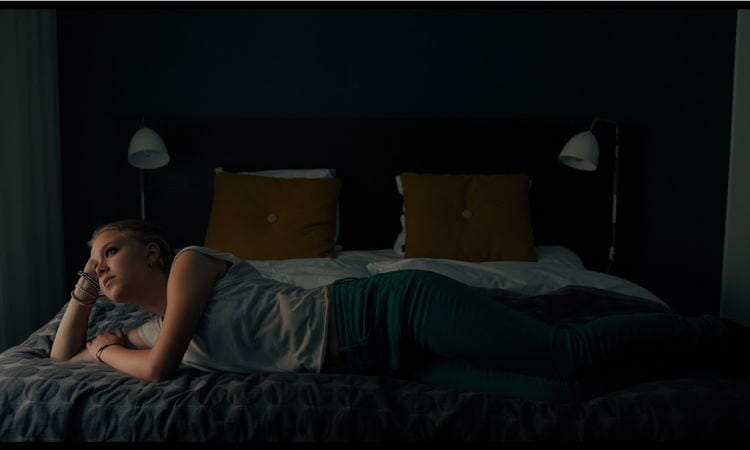By Michael Schilf · January 18, 2014

It was my first day at Slamdance, and my very first film of the festival, and seeing the world premiere of Copenhagen, by writer/director Mark Raso, was the perfect film to jumpstart my festival experience.
While traveling through Europe, William (Gethin Anthony), an immature late 20-something American, ends up in Copenhagen with the goal of finding his last living relative: his grandfather. Armed with only a few photos of his recently deceased father and a Danish letter his father wrote to his grandfather, William meets Effy (Frederikke Dahl Hansen), a young girl working at a coffee shop for her school internship project. When William asks Effy if she could read the letter and the address (which is written in Danish), she spills coffee over the address, and thus, their relationship begins.
Despite William’s crude and sophomoric attitude, there is something about William that intrigues her, and she agrees to help him find his grandfather. Spilled coffee leads to a two-day adventure, which ignites a powerful infatuation from both. Is it love? They believe it is, but when William discovers Effy is only 14 (she’ll be 15 in a couple of days), his already questionable ethics are now in direct conflict with his desire.
But Copenhagen is much more than a story of “boy meets girl.” Writer and director Mark Raso (recipient of the prestigious Student Academy Award Gold Medal for his short film “Under” in 2012) is also exploring the “yearning of adventure” and the “search for identity.” William has no idea who he is, yet by meeting the young Effy, who is wise beyond her years, his European adventure morphs into personal discovery. And even though we may not excuse his actions, we can empathize with his anger. With a father who abandoned him as a child and no family left, William is lost, and we’re hoping that finding his grandfather will help him to better understand where he comes from and find some closure.
Beyond the love story and threads of personal discovery, Raso’s ability to capture the world of Copenhagen is spot on. This is no surprise, not only because he shot the film in 24 days in Copenhagen, but Raso also lived in Copenhagen for a year in the mid 2000s, and therefore, his sensibility of the place itself was exemplary. And this is no small compliment, because the city itself becomes a character within the film. From the socialist aspect of bicycles for all to the commonality of 14 and 15 year olds hanging out in the club scene, I was transported back to my own travels when I was backpacking through Europe – Copenhagen included – back in my mid-twenties.
Lastly, the music. The soundtrack is compiled completely with Danish music, two tracks of which are actual scenes within the film (Effy sings a song in a karaoke bar and there is an acoustic performance from an artist in local night club). Incorporating only Danish music was a brilliant choice by Raso as it only adds to the films authenticity.
In the end, I can give Raso and his team only the highest praise. Copenhagen is a wonderful little film, delivering two tremendous performances from Gethin Anthony and Frederikke Dahl Hansen, infectious music that pulls you effortlessly, and a talent in writer/director in Mark Raso that is truly exceptional.